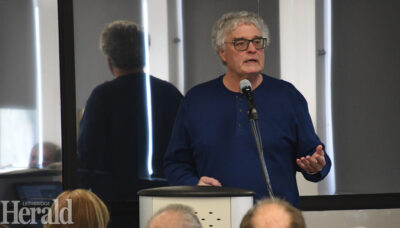World needs to mitigate and adapt to climate change: expert
By Ry Clarke - Lethbridge Herald Local Journalism Initiative Reporter on March 24, 2023.
 Herald photo by Ry Clarke
Retired university professor James Byrne speaks during Thursday's SACPA session.
Herald photo by Ry Clarke
Retired university professor James Byrne speaks during Thursday's SACPA session.The Southern Alberta Council on Public Affairs welcomed back James Byrne to its Thursday session speaking on the topic of “Climate, Energy, and Sustainability: Where are we? Where do we go?”
Byrne is a professor emeritus at the University of Lethbridge, and although retired he continues to have an active voice in the field of climate studies, sharing those insights and teachings with audience members.
“I’ve been working on climate change almost all my life, I published my first paper on climate change in 1989. You know, climate change is both a really bad news story on one hand, and a good news story on the other, it depends on what we do,” said Byrne.
“What we have really got to do is make sure that we take the steps that would make things better, that will make climate change better, allowing us to mitigate and adapt to climate change, develop resilience to this change.”
Byrne commented on Premier Danielle Smith’s speech on Wednesday, at the spring convention of the Rural Municipalities of Alberta (RMA) held in Edmonton.
“She said renewable energy is unreliable and Alberta should build more gas-fired power plants for a more predictable source of electricity,” said Byrne.
“Natural gas is as bad as coal, you know the leakage of natural gas. I probably don’t have to tell most of the audience this, you have all known it for years, that is the case.”
Byrne notes with climate change, we have to push for the change. “Lethbridge people realize that there is some real value to be had from adapting to climate change, or mitigating for climate change. We can become the big energy centre in Alberta despite Fort McMurray. They cannot keep going more than a decade, maybe a decade and a half. Then the oilsands will have to wind down. But what is coming next is renewable energy, wind turbines, solar panels, big grid scale batteries,” said Byrne, noting that the cost of repairing climate change has dropped in half since his last analysis in 2007.
Byrne notes we need to act fast to preserve the planet for future generations.
“The AR Six report is out (Sixth Assessment Report from the Intergovernmental Panel on Climate Change) and essentially this is our final warning, we are reaching what we think will be the tipping point if we do not do a lot in the next 10 years. Our children are in deep trouble, our grandchildren are in deep, deep trouble. The climate is changing radically and causing all kinds of problems,” said Byrne.
Byrne says air pollution is killing people with related diseases. “Nine million people a year are dying of air pollution-related diseases, and the health-care costs are in the trillions of dollars. Health-care costs alone are a great reason to get the hell off of fossil fuels,” said Byrne.
“Once you are exposed to a certain amount of air pollution toxin, that is all it takes to tip you over if you are sensitive.”
Byrne added “he climate change crossroads is terrifying and exciting. We have to decide what we are going to do,” said Byrne. “There are two sides to this coin, really dark and light. We will see which side of that coin we end up on.”
14-13




